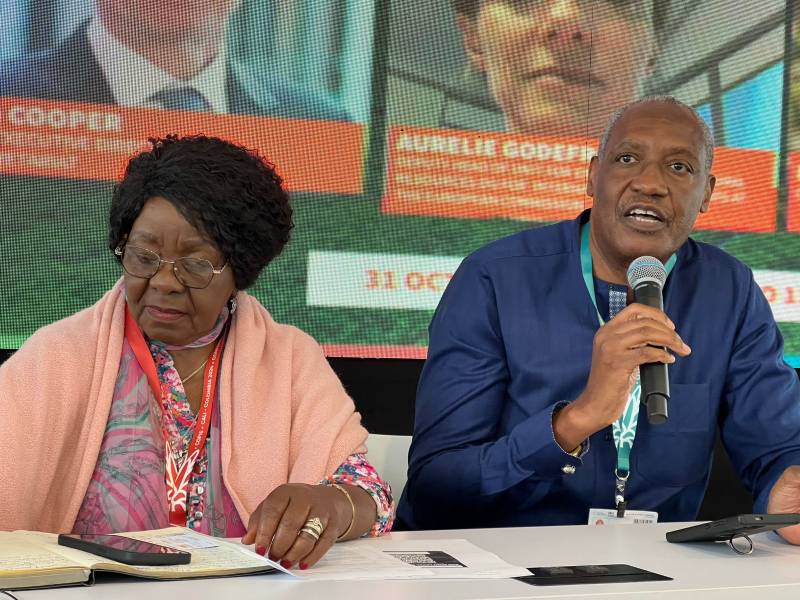AWF Statement on UN Biodiversity COP16

AWF CEO Kaddu Sebunya (right) with Zimbabwe's Minister of Environment, Climate, and Wildlife, Dr. Sithembiso Nyoni, at COP16.
The African Wildlife Foundation (AWF) commends the significant advancements made at the UN Biodiversity Conference, COP16, which concluded in Cali, Colombia on November 2. It highlighted a strengthened global resolve to promote inclusive, equitable, and sustainable conservation efforts. However, the lack of closure in negotiations and the suspension of the meeting sends a clear message that more work needs to be done to reach a common agreement on substantive issues related to reversing biodiversity loss globally.
The conference was intended as a critical status check on the world’s progress toward protecting biodiversity, and all indicators are now flashing red. While participating countries were urged to submit either national targets or revised national biodiversity strategies and action plans for the conference, only 115 countries out of a possible 196 submitted national targets and 36 presented national biodiversity strategies and action plans aligned to the Global Biodiversity Framework (the agreed set of targets and strategies adopted COP15 in 2022).
Chief among our concerns is that countries are not on track to meet the target of protecting 30% of the world’s land and water by 2030—a vital goal to curb biodiversity loss and prevent the degradation of ecosystems essential to planetary health. “This is below target and without substantial progress in conserving critical ecosystems, the cascading consequences for all countries will be severe, affecting food security, climate resilience, and global stability,” noted Frederick Kwame Kumah, AWF’s Global Leadership and Policy lead.
Finance remains the primary sticking point, with a notable disconnect between pledges and the level of funding necessary to meet the targets. Despite expectations that US $20 billion would be committed to conserving the planet’s biodiversity by 2025, contributions to the Global Biodiversity Framework Fund (GBFF) have only reached a paltry US $370 million. Additionally, there has been almost no advancement in shifting harmful subsidies that drive deforestation, pollution, and other forms of environmental destruction. “While 46 African countries have submitted national targets with Uganda among the first globally to submit an updated national biodiversity strategy action plan, the suspension of COP16 without a decision on resource mobilization signals a pause at a critical juncture, underscoring the need for greater cooperation and funding to turn commitments into actionable change” emphasized Simangele Msweli, AWF’s senior manager for youth programs.
Despite the disappointing end to negotiations in Cali, Colombia. AWF recognizes certain steps forward:
- The creation of the Subsidiary Board for Full and Effective Participation of Indigenous Peoples and Local Communities (IPLCs) in work undertaken under the Convention on Biological Diversity, is a landmark achievement that recognizes the critical role IPLCs play in safeguarding ecosystems and biodiversity. This body will be a fundamental means of ensuring IPLCs have a formal platform to contribute their deep-rooted knowledge and experience, which have been vital for effective conservation practices. This step aligns with AWF’s mission to elevate IPLCs in conservation governance, fostering culturally respectful and ecologically sound policies.
- The establishment of the Cali Fund for benefit-sharing from the use of Digital Sequencing Information (DSI). This underscores a commitment to creating fairness in the utilization of natural assets and their components. AWF supports efforts that empower local and Indigenous communities to access the economic benefits derived from their biodiversity resources, ensuring that these resources are utilized sustainably and ethically. This outcome promotes a conservation model that preserves natural habitats and contributes to economic resilience and long-term community development.
- The elevation of the need to recognize and support the essential role played by Afro-descendant communities in conservation as a testament to their historical and ongoing commitment to environmental stewardship. AWF celebrates this acknowledgment as a step toward correcting long-standing inequities and ensuring these communities have a voice in shaping conservation strategies that impact their lands and livelihoods. By championing their contributions, COP16 paves the way for more inclusive partnerships and the integration of diverse perspectives that enrich conservation efforts.
- The adoption of the first-ever Global Plan for Biodiversity and Health acknowledges the intricate link between ecosystem health and human wellbeing. This outcome underscores that conserving biodiversity is an environmental imperative and a public health priority. As the world navigates post-pandemic recovery, AWF supports the protection and restoration of natural habitats to strengthen resilience against future health crises. We urge global partners to integrate health considerations into conservation strategies, fostering partnerships between public health, environmental sectors, and local communities to promote a holistic, nature-based approach to global health security.
With the United Nations Conference on Climate, COP29, beginning November 11, 2024, AWF commends the biodiversity conference negotiators for reaffirming the critical connection between biodiversity conservation and climate action, emphasizing the importance of cooperation between biodiversity and climate conventions.
"Addressing the intertwined biodiversity and climate crises is essential for achieving lasting, impactful solutions. AWF champions cohesive policies and collaborative strategies, emphasizing the importance of forging stronger partnerships and ensuring robust commitments to climate and conservation finance to co-design initiatives that build resilience, particularly in regions like Africa, where the dual impacts of climate change and biodiversity loss are most severe. Committed to equity, effectiveness, and the urgency of collective action, we stand ready to work hand in hand with global partners to drive meaningful progress that aligns with the aspirations of all committed to this vital mission," affirmed Kaddu Sebunya, AWF CEO.